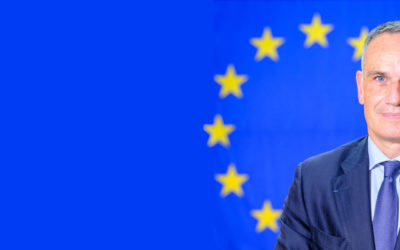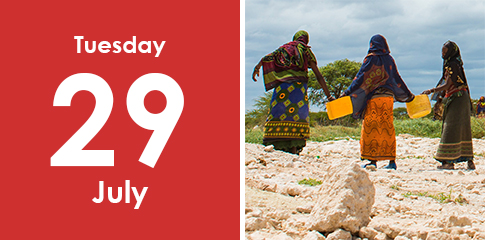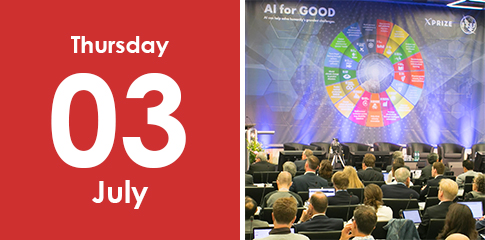This investigation constitutes part of a trilogy of articles in three different language usages (English, French, Spanish). The research was guided by Stefan G. Ziegler, the Conflict Transformation Technique’s (CTT) course facilitator and conducted, as well as analysed, by three alumni researchers (more context at the bottom of the page). Respondents for the English article come from Central Asia and the Middle East, for whom English is not native but is the main language of professional communication.
English is a globalised language used as a lingua franca for communication between people who speak different languages. It’s also a source language for new and internationally widespread words, meanings, and concepts like “advocacy”.
“Advocacy” is often perceived as an Anglicism partially incorporated into local languages, and we understand “humanitarian advocacy” in the same way when we use the English term in other languages. When the four respondents and I use it in our native languages, differences show up. They confirm the widespread perception of it as referring to a practice of Western origin and, at the same time, somehow assimilated into local realities. “Before the word ‘advocacy’ we had similar meaning when voicing and calling for justice and promoting righteousness in society”, says the respondent from Palestine. Many see it as their responsibility to call for justice and to speak out against injustice and inequality.
Ultimately, the specific meaning of “humanitarian advocacy” may vary depending on the context in which it is being used, as well as the goals and priorities of the individuals or organisations using the term. “Advocacy” is often seen as referring to a way to fulfil one’s duties as a member of the community.
In post-soviet political discourse, “advocacy” was and still is associated with the term “propaganda”. This commonsensical connection can even be found in Western publications in Russian. For example, in the Russian edition of National Democratic Institute’s publications “advocacy” and “propaganda” are given as similar terms and defined as “a set of organisational-strategic political actions aimed at influencing decision-makers in order to influence those decisions”¹. While both advocacy and propaganda may use persuasive techniques to communicate their message, the main difference is that advocacy is seen as focused on promoting positive change and enlightening or creating public awareness, while propaganda connotates manipulating and deceiving people for a specific agenda.
“Advocacy can work when consensus about the case is already there, and the situation is evolving to be voiced,” says the respondent from Central Asia. “When advocacy raises the issue silenced in a society, its defenders can be easily labelled and perceived as servants of foreign agenda.” Another person interviewed from the Caucasus even goes so far as to say that humanitarian advocacy is effective only in conjunction with mediation and negotiation. She limits it to politics and culture and stresses the importance of carrying out actions in a transparent and accountable manner to gradually gain credibility and trust. Respondents also agree that humanitarian advocacy can be a technique used to transform conflicts, but they stress the importance of carefully considering one’s approach and ensuring that efforts are well-informed and ethical.
Conclusion
This research has clearly illustrated that “advocacy” is not a homogenous term commonly shared with the same meaning. Although the research team cannot be held accountable for the entirety of this pilot study, their conclusions do give rise to the below recommendations. It remains for the reader to evaluate the implications of different meanings of “advocacy” in seeking voice for the most vulnerable in conflict or post-conflict theatres. The following conclusions are made up of language interpretations under study highlighting general and extreme tendencies:
In the English language, “humanitarian advocacy” has a relatively broad meaning starting from its legal connotation to the application in communications and even lobbying for the benefit of those with lesser voice. It is interesting to note that in the Russian language, for example, some associate “advocacy” with “propaganda” and “manipulation” (see endnote), others see “advocacy” as a way to fulfil one’s social duties and promote positive change as part of their communities.
In the Latin American context (read Spanish article), religious communities, the Jesuits at the fore, can be considered precursors to the practice of “advocacy”, not least because of their aim to promote social justice. Also, in the same language environment, there are a variety of terminologies to express “advocacy” depending on geographical and situational context. The English version has been appropriated by social actors predominantly for reasons of attracting international donor funding.
Although the term “advocacy” in French (read French article) has strong legal connotations exemplified by the term “plaidoyer”, it does help to understand the important underpinning of law in conducting advocacy work. However, the meanings of the term “plaidoyer” may differ etymologically from “advocacy”; their intended aim is the same, namely, to strive for positive social change.
Recommendations
Following on from the individual conclusions above, the research team recommends (1) a deeper and more nuanced study into the subject matter. (2) International institutions should be aware that different language or culturally specific interpretations of the meaning of “advocacy” can potentially have sizeable unintended impacts on their work worldwide.
This said, our team draws the attention of those institutions that employ “advocacy officers” to define what “advocacy” means more clearly in their own service.
Erik Bagdasaryan
DPP alumni researcher for the English version of the article
erik.baghdasaryan@graduateinstitute.ch
Stefan G. Ziegler
DPP Conflict Transformation Technique’s (CTT) course facilitator and conductor of the research
stefan@ziegler.net
¹ (Kourtney Pompi, Lacey Kohlmoos. Political-Process, March 7, 2011. Monitoring: Activist Tools and Techniques, https://www.ndi.org/sites/default/files/Monitoring%20politicheskikh%20protsessov.pdf).
THE RESEARCH
The articles are published by three alumni of the Graduate Institute’s Development Policies and Practices 2022 course which was simultaneously taught in Spanish, French and English giving rise to this research. Conflict Transformation Techniques (CTT), Module 3, evoked questions of the meaning of advocacy in different contexts which the three volunteered to inquire in more detail:
Patricia MENDIOLA BADARACCO (Spanish version)
Shirin GOLKAR (French version)
Erik BAGDASARYAN (English version)
Samples of a population of respondents from the same course but with different language backgrounds have been interviewed after taking part in the same course facilitated by Stefan G. Ziegler who designed the CTT course according to his over 20 years of humanitarian field experience and his pedagogical know-how.
Thanks are due to the numerous students from the different language classes for their readiness to help with the research and their valuable insights from practice.









I had the privilege to meet Stefan via an academic research on human rights and gender mainstreaming. His approach to humanitarian law and human rights revealed his dedication to serve the international community and the most vulnerable among us. He constantly reminds us that we belong to the same human family. He is brilliant, creative and inspiring. His generosity, kindness and authenticity are values that you must not only look for if you embark in a human rights project(would it be research or practice) but embrace without looking back. As Stefan and his valuable work demonstrate, human values are the only sustainable path to dignity, freedom and justice for all.
It’s fascinating to see how the term ‘advocacy’, so crucial in humanitarian efforts and conflict resolution, can take on different shades of meaning based on a society’s cultural, social, and political backdrop.
The points raised about international institutions being aware of these differences are particularly resonant, considering the key role advocacy plays in their operations. The suggestion to have a clear, context-specific definition of advocacy within organisations is a thought-provoking idea that could prevent misunderstandings and unforeseen consequences.
It’s intriguing how in some cultures, advocacy might be linked with words such as ‘propaganda’ or ‘manipulation’. This certainly calls for a more in-depth and subtle exploration of the topic, which could contribute to developing communication strategies that are both effective and culturally sensitive.
The article stands as a reminder that a single word can conjure up a spectrum of interpretations across different cultures. Recognising and respecting this fact in our communication, especially in cross-cultural scenarios, seems vital.
Well done to the team behind this enlightening piece!
Super interesting and indeed important to discuss the meaning, relevance and impact (or not) of ‘humanitarian advocacy’. In my most recent humanitarian role, I was told time and time again it was ‘not our place’ to do advocacy (on a fundamental human rights issue of devastating severity) but rather to respond to those affected. My arguement was always, “I’d rather there not be a problem to have to respond to in the first place”, and the only way that was going to come about was through coherent, targeted evidence-based advocacy by the only player in a position to do to – the humanitarian ‘community’. Alas, there was no consensus and the issue was shut down. Until…donors came asking questions and agencies realised advocacy could lead to income!
Delinked advocacy from the grubby bun fight that is the search for donor money is perhaps a new definion, that could be translated into a host of languages, that should have the same meaning across all contexts!